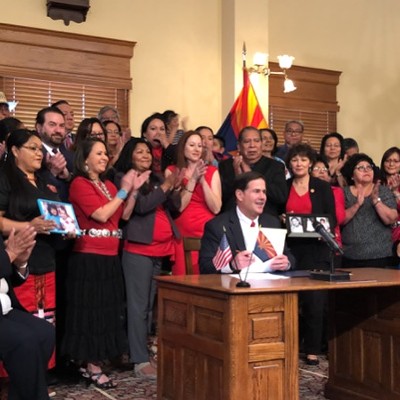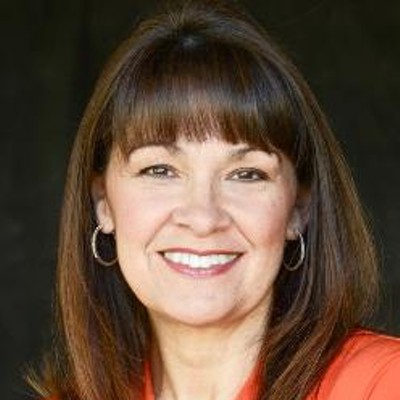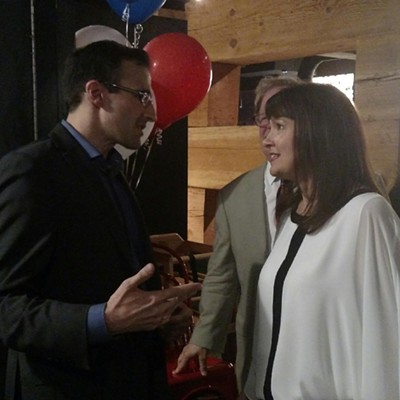The candidates for Legislative District 9 are happy to share their stories behind their decisions to run for public office.
Democratic incumbent Victoria Steele spent her middle school years in Franklin, Penn., as a victim of bullies. She finally socked one in the face and spent her time in detention making campaign signs to run for student body vice president—an election she won. She now likes to say that she stands up to bullies in the GOP whenever she goes to Phoenix.
Republican freshman Ethan Orr's run for public office came out of a desire to help his fellow Tucsonans—as he did when he created Linkages, a nonprofit that connects people with disabilities to potential employers.
And Democratic challenger Randy Friese, an emergency room surgeon who treated victims of the Jan. 8 shooting, decided he could do a similar good at the Capitol.
As one of only two swing districts in Tucson (the other is LD 10), Legislative District 9 is is considered a toss-up this November.
The district sits directly in the middle of north and central Tucson, encompassing Catalina Foothills and pieces of Flowing Wells and Casas Adobes. A list of registered voters from the Secretary of State in August—the most recent data—lists a district make-up of 36 percent Democrat, 32 percent Republican and Independent and a miniscule .9 percent Libertarian.
Following two district debates—one in September, hosted by the Citizen Clean Elections Commission and the other earlier this month presented by the Tucson Weekly—the issues surrounding the district were agreeably education, the economy and getting the budget back under control.
Orr's first term in office saw its fair share of turbulence.
A vote against his party to support Gov. Jan Brewer's Medicaid expansion in 2013 led to Republican conservatives disowning him, but his anti-abortion and pro-gun votes have Democrats unhappy as well. And then earlier this year, Orr announced his split with Linkages.
Just weeks before the election, Orr remained optimistic, albeit critical of his opponents' tactics.
"I've passed more legislation than the entire minority caucus," Orr said. "The only thing you can do is distract the voters with frivolous charges and frivolous lawsuits, and that's exactly what they've done."
Orr points to his progress in education, namely his help getting $40 million to Arizona schools. He also cites his plan next year to make affordable funding for high school students interested in dual-enrollment in college classes, allowing students to take classes toward an associate degree simultaneously with their high school classes.
A Republican serving a region largely dominated by Democrats, Orr said his spot in the GOP gives his constituents a voice among the majority party that his seatmate Steele and newcomer Friese can't provide.
"There are a lot of pragmatists that understand how important it is to have a seat at the table," Orr said. "When the state makes its budget, we need someone from Southern Arizona that is at that table setting the budget."
But Friese and Steele haven't bought in to that ideology, both saying that not every single decision is determined by those in the majority. Still, Orr said as someone with experience making laws surrounding education, working with developmentally challenged people and growing up in Tucson will make a difference in November.
"Every single walk—and we've done a lot of walking—I knock on a door, and I went to high school with someone, I've worked with them, I helped their family member get a job," Orr said. "I think that matters."
Steele's days punching bullies are over, and she's since worked as a journalist and mental health counselor. Like Orr, Steele's focus is on education, which she said is one of many issues that go back to the state's economy.
Earlier this year, she called a special session to address the issues behind education funding last spring, and she's calling a recent court order requiring lawmakers to provide an additional $317 million to Arizona schools a victory for state education.
Still, she's frustrated that the check hasn't been cut.
"Waiting is playing politics," she said. "That's balancing the budget on the backs of our children. That's not OK and I will fight that with everything I've got."
Steele also points to improving trade relations with Mexico as important ventures in bettering the state's economy.
Steele speaks passionately about her fight for women's rights in the state. She has criticized the GOP for its push against women's reproductive health like abortion and birth control and social issues like equal pay—issues where no progress has been made, she added.
She didn't mince words when it came to her Republican seatmate and his party.
"There's more of them than there are of us," she said of Republicans in Phoenix. "And until we get a different balance, women are going to continue to lose rights. That's why, even as much as I like Ethan, I hope he doesn't get re-elected."
Friese talks often about his upbringing as a product of public education. The surgeon and UA professor has strongly held onto support for schools as the foundation of his platform.
Friese added that Orr's stance on education is not one of support. Instead, Friese said, Orr is focused on schools, but not public schools. He cites Orr's vote to expand tax credits for those paying tuition for private schools.
"One of them was such an abhorrent expansion that it had no limit upon the tax credits that the corporations over the years take," Friese said. "The governor actually vetoed that bill."
Friese's stance has drawn the support of local heavyweights like Gabby Giffords and her husband Mark Kelly—support that Friese said he gladly welcomes but doesn't overshadow the support he's received from anyone else.
As a newcomer whose win would mean working with a seatmate from either party, Friese said he plans to work with what the election gives him, and expressed a willingness to work across the aisle.
"That's what politics is about," he said. "You expose your differences during election cycles, and then you find your common ground, you find your common values when it's time to work together in session. I absolutely think that's part of the process."












